
Resources
Browse our full library of in-depth resources and publications
The PacWastePlus programme team is committed to producing meaningful and valuable publications and resources that provides guidance for improving waste management in the Pacific
Search
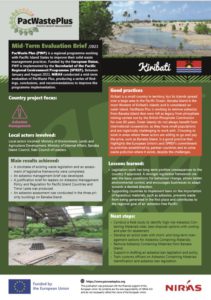
General
Mid-Term Evaluation PacWaste Plus Programme – Kiribati Project Evaluation Brief
The Pacific – European Union Waste Management (PacWaste Plus) Programme has completed an external Mid-Term Evaluation. The evaluators from NIRAS International Consulting have produced a suite of products highlighting the Mid-Term Evaluation findings. This country brief highlights the mid-term review findings for the Kiribati PacWaste Plus project.
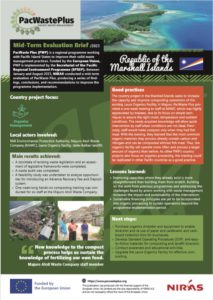
General
Mid-Term Evaluation PacWaste Plus Programme – Republic of the Marshall Islands Project Evaluation Brief
The Pacific – European Union Waste Management (PacWaste Plus) Programme has completed an external Mid-Term Evaluation. The evaluators from NIRAS International Consulting have produced a suite of products highlighting the Mid-Term Evaluation findings. This country brief highlights the mid-term review findings for the Republic of Marshall Islands PacWaste Plus project.
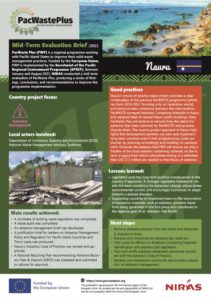
General
Mid-Term Evaluation PacWaste Plus Programme – Nauru Project Evaluation Brief
The Pacific – European Union Waste Management (PacWaste Plus) Programme has completed an external Mid-Term Evaluation. The evaluators from NIRAS International Consulting have produced a suite of products highlighting the Mid-Term Evaluation findings. This country brief highlights the mid-term review findings for the Nauru PacWaste Plus project.
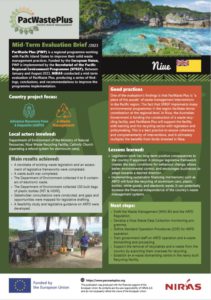
General
Mid-Term Evaluation PacWaste Plus Programme – Niue Project Evaluation Brief
The Pacific – European Union Waste Management (PacWaste Plus) Programme has completed an external Mid-Term Evaluation. The evaluators from NIRAS International Consulting have produced a suite of products highlighting the Mid-Term Evaluation findings. This country brief highlights the mid-term review findings for the Niue PacWaste Plus project.
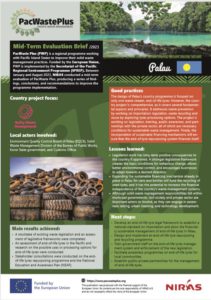
General
Mid-Term Evaluation PacWaste Plus Programme – Palau Project Evaluation Brief
The Pacific – European Union Waste Management (PacWaste Plus) Programme has completed an external Mid-Term Evaluation. The evaluators from NIRAS International Consulting have produced a suite of products highlighting the Mid-Term Evaluation findings. This country brief highlights the mid-term review findings for the Palau PacWaste Plus project.
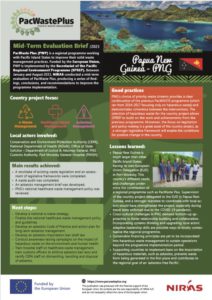
General
Mid-Term Evaluation PacWaste Plus Programme – Papua New Guinea Project Evaluation Brief
The Pacific – European Union Waste Management (PacWaste Plus) Programme has completed an external Mid-Term Evaluation. The evaluators from NIRAS International Consulting have produced a suite of products highlighting the Mid-Term Evaluation findings. This country brief highlights the mid-term review findings for the Papua New Guinea PacWaste Plus project.
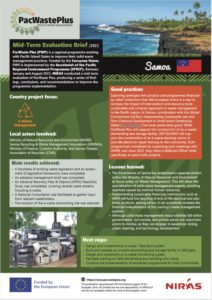
General
Mid-Term Evaluation PacWaste Plus Programme – Samoa Project Evaluation Brief
The Pacific – European Union Waste Management (PacWaste Plus) Programme has completed an external Mid-Term Evaluation. The evaluators from NIRAS International Consulting have produced a suite of products highlighting the Mid-Term Evaluation findings. This country brief highlights the mid-term review findings for the Samoa PacWaste Plus project.
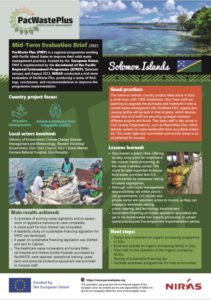
General
Mid-Term Evaluation PacWaste Plus Programme – Solomon Islands Project Evaluation Brief
The Pacific – European Union Waste Management (PacWaste Plus) Programme has completed an external Mid-Term Evaluation. The evaluators from NIRAS International Consulting have produced a suite of products highlighting the Mid-Term Evaluation findings. This country brief highlights the mid-term review findings for the Solomon Islands PacWaste Plus project.
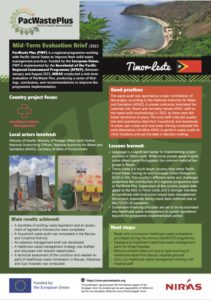
General
Mid-Term Evaluation PacWaste Plus Programme – Timor-Leste Project Evaluation Brief
The Pacific – European Union Waste Management (PacWaste Plus) Programme has completed an external Mid-Term Evaluation. The evaluators from NIRAS International Consulting have produced a suite of products highlighting the Mid-Term Evaluation findings. This country brief highlights the mid-term review findings for the Timor-Leste PacWaste Plus project.
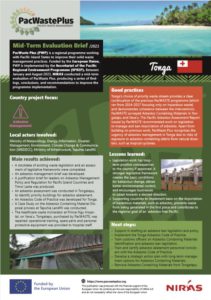
General
Mid-Term Evaluation PacWaste Plus Programme – Tonga Project Evaluation Brief
The Pacific – European Union Waste Management (PacWaste Plus) Programme has completed an external Mid-Term Evaluation. The evaluators from NIRAS International Consulting have produced a suite of products highlighting the Mid-Term Evaluation findings. This country brief highlights the mid-term review findings for the Tonga PacWaste Plus project.
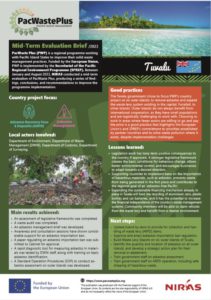
General
Mid-Term Evaluation PacWaste Plus Programme – Tuvalu Project Evaluation Brief
The Pacific – European Union Waste Management (PacWaste Plus) Programme has completed an external Mid-Term Evaluation. The evaluators from NIRAS International Consulting have produced a suite of products highlighting the Mid-Term Evaluation findings. This country brief highlights the mid-term review findings for the Tuvalu PacWaste Plus project.
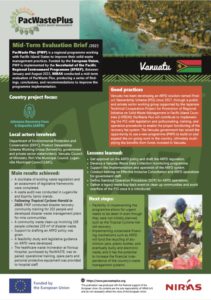
General
Mid-Term Evaluation PacWaste Plus Programme – Vanuatu Project Evaluation Brief
The Pacific – European Union Waste Management (PacWaste Plus) Programme has completed an external Mid-Term Evaluation. The evaluators from NIRAS International Consulting have produced a suite of products highlighting the Mid-Term Evaluation findings. This country brief highlights the mid-term review findings for the Vanuatu PacWaste Plus project.
Newsletter Subscription
Would you like to subscribe to our quarterly programme newsletter-The Connection?
We care about the protection of your data. Read our Privacy Policy.
Newsletter Signup
To sign up to our newsletter, enter the information below and we will add you to our mailing list for all future regional and project updates.
